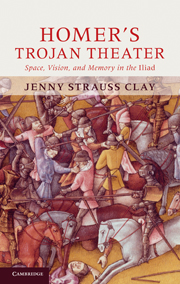Preface
Published online by Cambridge University Press: 05 October 2012
Summary
When the definitive work on the tedium of great art is written, it will doubtless devote lengthy chapters to The Fairy Queen, Paradise Regained, La nouvelle Héloïse, Wilhelm Meister, I promessi sposi, and Balzac's fifty-page description of a card game played in only one area of Normandy – readers will each have their favorite candidates for inclusion. But, for many, a shoo-in for a substantial entry would be the Iliad's Catalogue of Ships and especially the so-called Battle Books, by which I mainly mean Books 12–15. To be sure, the narrative is relieved by rousing speeches, especially the heroic exhortation of Sarpedon, the sometimes stunning similes, and the often touching “obituaries” of fallen warriors, not to speak of the high comedy of Zeus's seduction by Hera. Nevertheless, I am aware (as are my editors) of the dangers that lie in wait for someone who focuses on those very descriptions of combat that so many find tedious. But for those willing to soldier on with me, I hope that they will find themselves rewarded by a clearer understanding of the Iliad's narrative – even the apparent longueurs – and an appreciation of the epic's construction and the poem's techniques of communication. Ultimately, I invite my readers to re-experience the ancient war between the Greeks and the Trojans, joining the poet and his audience in a shared imaginative vision.
- Type
- Chapter
- Information
- Homer's Trojan TheaterSpace, Vision, and Memory in the IIiad, pp. ix - xPublisher: Cambridge University PressPrint publication year: 2011



